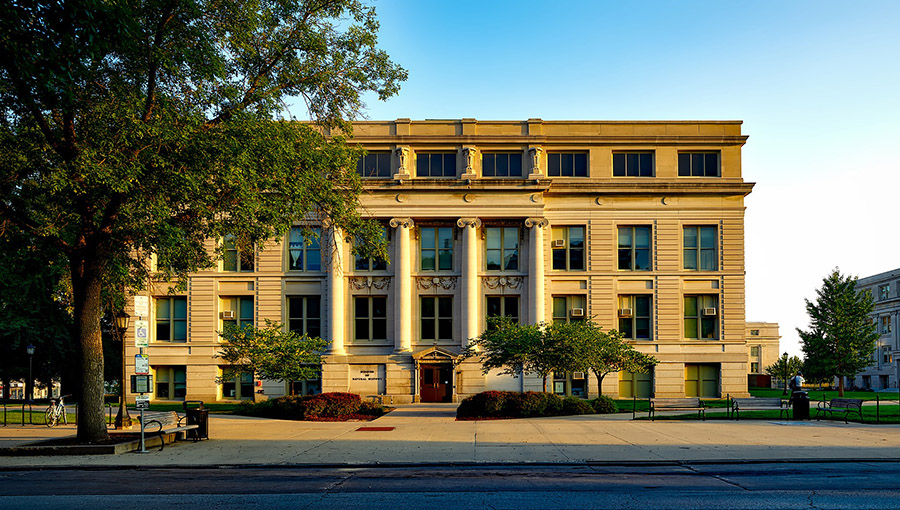His Story Becomes Our Story
By Nick Nowalk
Christians who are serious and well-intentioned about their faith often experience angst-filled perplexity when they ponder the significance of the Gospel for what many of us inevitably spend most of our waking adult lives doing: working.

What does following Jesus have to do with one’s career? What does it actually look like to do everything in life to the glory of God (1 Corinthians 10:31)?
How can someone do everything he or she does at work in the name of the Lord Jesus (Ephesians 5:20, Colossians 3:17), working heartily for the Lord and not for human beings (Colossians 3:23)? Endless sermons and books on this freighted topic are, of course, readily available and worth pursuing.
I want to begin by (briefly) insisting that to talk about ethics (what am I to do with my life?), we must first consider story (who am I? what’s wrong with the world? what am I here for? etc.). Whatever ideology or worldview or moral vision we may find ourselves giving allegiance to, all of us do so only insofar as we inhabit—consciously or not—a story that provides direction and meaning for our lives. As the philosopher Alasdair MacIntyre once famously wrote in After Virtue: A Study in Moral Theory:
“Man is in his actions and practice, as well as in his fictions, essentially a story-telling animal…I can only answer the question ‘What am I to do’ if I can answer the prior question ‘Of what story or stories do I find myself a part?’…Deprive [human beings] of stories and you leave them unscripted, anxious stutterers in their actions as in their words.Hence there is no way to give us an understanding of any society, including our own, except through the stock of stories which constitute its initial, dramatic resources.”
The depth and richness of the Christian story and its ability to make sense of the complexity, the frustrations, and the yearnings of human existence accounts in large part, for the perennial attraction by which so many are pulled toward Jesus. The many-side contours of the Christian narrative cannot be pursued here in full, but I will content myself with highlighting three crucial strands of our story as it relates to work—all with an eye on Paul’s magnificent letter to the Colossians. The story of the Gospel reminds us that our work is (new) creational, that it is missional, and above all else, that it must be Christ-shaped. Let’s look at each of these in order.
First, the Gospel teaches us to approach our work within the framework of creation—and, more particularly, God’s commitment to renew creation’s goodness through His Son. Colossians 1:15, clearly echoing Genesis 1:26-28, portrays Jesus as the “image” of the invisible God and the “firstborn” (i.e. ruler) over all of creation. The life, death, and resurrection of Jesus, in other words, were no de novum arising in a historical vacuum; they were the fulfillment of God’s original purposes in the creation of humanity. And central to those purposes, according to Genesis 1:26, 28 and 2:15, was work.
God has not given up on the goodness of work in the lives of human beings—those in Christ still have work to do (Col. 1:10, 3:23)! Indeed, the shape and goal of the Christian life as a whole is to be renewed in the “image” of our Creator (Col. 3:10), transformed to reflect His character through our deeds once more. Salvation is not merely or mainly about the forgiveness of our sins or an amoral guarantee of bliss in the afterlife. Rather, as James Dunn points out in Christology in the Making: A New Testament Inquiry into the Origins of the Doctrine of the Incarnation, “[Paul] understands salvation as the fashioning or reshaping of the believer into the image of God.”
This is what the early church theologian Irenaeus meant by his favored (and strange) term “recapitulation.” In Christ, God has launched a redemptive “do over” of the human drama. Jesus has become what we were supposed to be all along as genuine, God-reflecting human beings, doing for us what we can no longer accomplish because of sin. This is wondrously true, but incomplete. All of this took place in order that we might become what Jesus now is, conformed to His image through the grace of the Spirit and following in the footsteps of our forerunner (cf. Rom. 8:29, 1 Cor. 15:49, 2 Cor. 3:18, 4:4, Phil. 3:20-21). And that means, among much else, bearing God’s image through our daily work as God always intended in creation.
Second, the Gospel orients us missionally toward our work. Since Jesus is the new Adam (Col. 1:15) who renews us in God’s image (Col. 3:10) to work (Col. 1:10, 3:23), it should come as no surprise that Paul depicts the shape of the Christian life—both in conversion (Col. 1:6) and holy service (Col. 1:10)—as “bearing fruit and multiplying,” again indisputably evoking the language of Genesis 1. Work meant mission in the story of creation, with human beings called to extend God’s glory and presence and wise order to the four corners of the earth. In other words, creation was “good,” but it was not finished.
We were given the dignity and awesome responsibility of taking up where God had left off when He rested on the seventh day. Our work has always supposed to matter. In the same way, the work of the Gospel in us and through us is the form that the original mandate to work now takes in the world. As we live out every area of our lives under the lordship of the crucified and risen Jesus, God’s presence and rule are being subtly extended to the still-dark edges that pervade our lives east of Eden.
However, this does not mean ministry, per se. Everything we do, all activity that Christians engage in, is meant to be our “work” of bearing God’s image as we bear fruit and multiply spiritually throughout the world. Mission is a much larger category than ministry. Yet, we also must take note that the manner in which we now engage in our work requires holiness and virtue—walking in a manner worthy of the Lord (Col. 1:10).
In After You Believe: Why Christian Character Matters, N. T. Wright provocatively argues: “All Christian virtue is located within that vocation [of bearing God’s image in the wider world]…Ultimately, God does not want human beings as perfected individuals, all clean and scrubbed, but with nothing to do. Morality, surprisingly to some, is part of mission. Cleansed vessels are to be put to fresh use; conversely, fresh use requires cleansing.” Our work is effective in accomplishing God’s purposes, then, only to the extent that we engage in it with transformed, Spirit-driven character. Which leads us to our final point.
Third, if our daily work represents God’s renewal of creation’s original goodness and if it subsequently sends us out into the world in mission to bear fruit and multiply, Colossians also insists that everything we do must be Christ-shaped. At this point in the story, there is no going back to creation except through the cross (in the profound phrase of Oliver O’Donovan), and no mission that is not patterned after His death and resurrection for the life of the world. How else could it be if Jesus is the true “image” of the invisible God? What other ideal is possible when the image we are being refashioned into is His image? Irenaeus summarized his hugely important “recapitulation” theory with exactly this logic:
“Christ was in these last days, according to the time appointed by the Father, united to His own workmanship, inasmuch as He became a man liable to suffering … He commenced afresh the long line of human beings, and furnished us, in a brief, comprehensive manner, with salvation; so that what we had lost in Adam—namely, to be according to the image and likeness of God—that we might recover in Christ Jesus.”
Therefore, as Colossians 3:1-17 demonstrates, the “work” which we do “in the name of the Lord Jesus” (Col. 3:17) and for His sake (Col. 3:23) must participate in the way of life that Jesus engaged. That means being united to both His death and resurrection (Col. 3:1-4), fleshed out in unavoidably tangible ways in Colossians 3:5-11 (the cross) and 3:12-17 (the resurrection). We must die to all that is self-centered, idolatrous, and false—self-denial, as B. B. Warfield once quipped, is not about me. It is rather about preparing me to actually be useful to others in love, something I simply cannot be unless I am first stripped of all that tarnishes His image in me. Likewise, we must be reborn to self-giving love and humility, to truth telling and mercy.
Our service to the world, which is finally what our “work” must be about if we take the the narrative framework of the Gospel seriously, means bearing the image of the God who is known supremely and irrevocably in the face of the crucified, risen Lord Jesus. His story must now become our story before the eyes of a watching, dying world. The work of every Christian, whatever tasks each of us may spend our days and years laboring after, means the imitation of Christ.
Editor’s note: This article was originally written in 2014. Nick Nowalk, a pastor in New York City, is a former Christian Union teaching fellow.
To stay up to date with important articles like this one regarding Christian Union’s work in our nation and at influential universities, please subscribe to our newsletter: Click here.



